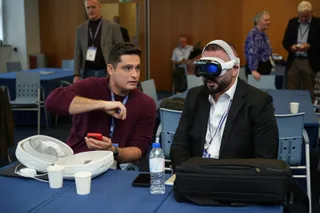DSET 2022 – Bold, Bigger, Diverse
Contact Our Team
For more information about how Halldale can add value to your marketing and promotional campaigns or to discuss event exhibitor and sponsorship opportunities, contact our team to find out more
The Americas -
holly.foster@halldale.com
Rest of World -
jeremy@halldale.com

The hybrid virtual/in-person format is working well for the annual Defence Simulation, Education and Training Conference and Workshop, reports MS&T Special Correspondent Andy Fawkes.
“Numbers are important” said Tess Butler, show organiser and Ruddy Nice CEO, at the opening of DSET 2022 (7-10 June, Ashton Gate Bristol, UK). As in 2021, the organisers faced exceptional challenges due to the pandemic but met them with boldness, moving to a summer month and continuing with a hybrid approach. If numbers are important then this approach paid off, with large numbers of delegates attending in person and online, and more exhibitors than before.
With a passion to embrace and promote collaboration, diversity, and inclusion, DSET is not only about numbers, and this was evidenced by the very broad range of delegate responsibilities and backgrounds and the dedicated conference events and channels. As defence and the S&T industry goes through significant technological and cultural changes, DSET is perhaps aligning itself well for the future.
Beyond Defence Training
Butler told MS&T that DSET is positioning itself to be a “key international community and conference in simulation, education and training”, not only for defence but wider, including Blue Light services (ambulance, police, fire, search-and-rescue). The numbers seem to reflect this with over 1,000 delegates from 32 countries attending, in-person and online, and for many over the week, both. Indeed, the four-day conference was designed around the hybrid approach with the first day being online only and the following three days both in-person and online. This made it very flexible for the attendees who could mix and match during the week and catch up after as necessary.
As in previous DSETs, the agenda was very much focused on serving its military and government audience who made up 72% of attendees. Such attendees are not charged, neither were the 8% academia, with all funding falling to the 20% industry attendees and the exhibitors and sponsors. The total numbers for DSET were impressive and the hybrid aspect did not appear to eat into the in-person attendance, which was around 600.
Every year DSET has increased its footprint at Ashton Gate Stadium and if the trend continues there no doubt will be more room for expansion at this venue. The venue does give a unique feel to the event and perhaps makes it more welcoming to a broader range of attendees, although the split level did require taking one’s chances with Bristol’s often wet and windy weather, even in a summer month.
Just prior to the pandemic DSET was already moving to a hybrid approach and for 2021 this was forced on the organisers as international travel was being disrupted. This was very much less the case for 2022 and like many events DSET could have gone live only, but for Ruddy Nice hybrid is the way forward. Butler explained that the purpose of the virtual element was twofold, to enable fuller participation in DSET, and provide a window into the live event so that participants can gauge the value of attending live in the future. The CEO told MS&T that many who attended virtually last year attended in-person this year and “we see that trend continuing with the feedback that we have already received from this year”. From this writer’s point of view, the hybrid aspect did provide significant flexibility and there were far fewer technical glitches than for 2021.
Diverse, Inclusive, Collaborative
Butler and her team are clearly passionate about diversity, inclusion, and collaboration. For Butler, this is not an ideology: “If we don't include the larger demographic of our population then we won't exist anymore” she told her audience. Two of the key DSET initiatives are the promotion of women in defence and support to young people entering the S&T space. DSET are proactively working to be welcoming to women, reaching out to individuals to mentor, and going to universities to brief on the skills and talent needed for the future. As demonstration of their success, the first ever Defence Women's Social was run at DSET 2022 with 150 attending, together with the Defence Women's Action Board the following day.
Back to numbers: of those who attended live this year, 17.5% were women, “which is hugely over the industry average of 2% in this space,” Butler told us, “And still higher than the 11% across the British Armed Forces.” Further, the conference programme was delivered by 42% women (against an industry average of 6-10%).
Looking to the future, DSET is aiming to achieve a 30% attendance goal before the MoD’s own target of recruiting 30% of the Armed Forces as female by 2030. With 40% of the DSET Interns already being female, this goal is looking quite achievable. Butler told MS&T, “We have some great plans for action and to move things forward to support women in the defence industry and become a force multiplier for the existing networks.”
Encouraging younger people to take up S&T careers is in everyone’s interest, according to Butler, both because of recruitment challenges and also the need to bring in people with different backgrounds and diversity of thought into S&T and wider defence.
For 2022, DSET had representation from 20 universities, including Bath Spa, Cambridge, Kings College London, Portsmouth, Bath, Staffordshire and Abertay. Some of the DSET Interns secured full-time employment contracts at the show with others having interviews lined up with companies that attended. “We are looking to accelerate this programme, support young people into this space, whilst providing industry with a pool of bright, keen and brilliant graduates for employment,” Butler said.
Abundance of Content
The virtual-only first day was principally a platform for industry briefings but it managed for the most part to avoid heavy marketing, and there were some interesting insights on S&T innovation from the defence and non-defence participants. For 2022 new themes were: Wargaming, VR/AR, and Navy and Maritime training. The Q&A was also quite active. The remainder of the conference was hybrid and for 2022 there were different streams so that attendees could better match their interests to the content. This makes it somewhat more difficult to pick and choose but most of the content was recorded for future viewing. Also, although not strictly a hybrid feature, some of the talks were delivered remotely, notably General de Divisão Eduardo Wolski who spoke from Brazil. Overall, the conference delivered a respectable update on S&T matters covering a broad range of topics and viewpoints.
Exhibitors Up 30%
If in-person has significant advantages over remote, then this certainly felt to be true for the exhibition which had a good “buzz” over the three days and provided an opportunity to network and catch up with existing and new contacts. DSET 2022 had 43 exhibitors and sponsors, which was up by 30% on 2021, together with representation from 220+ companies and organisations.
A key part of DSET is now the DSET Awards, which was a popular part of the third-day social event.
DSET will return to Ashton Gate 12-15 June 2023. For Butler, their driving force is “the high energy, collaborative approach, and positivity in resolving challenges and providing a return on investment for all attendees”. The team have already decided to bring back the wargaming stream “with more content and more opportunities to understand peer-to-peer, and the power and value of wargaming”, according to the CEO.
DSET has appeared to have ridden through the pandemic storm and come out with renewed energy, innovation, a mission to embrace diversity, and with more numbers, and MS&T is looking forward to what DSET 2023 brings.


